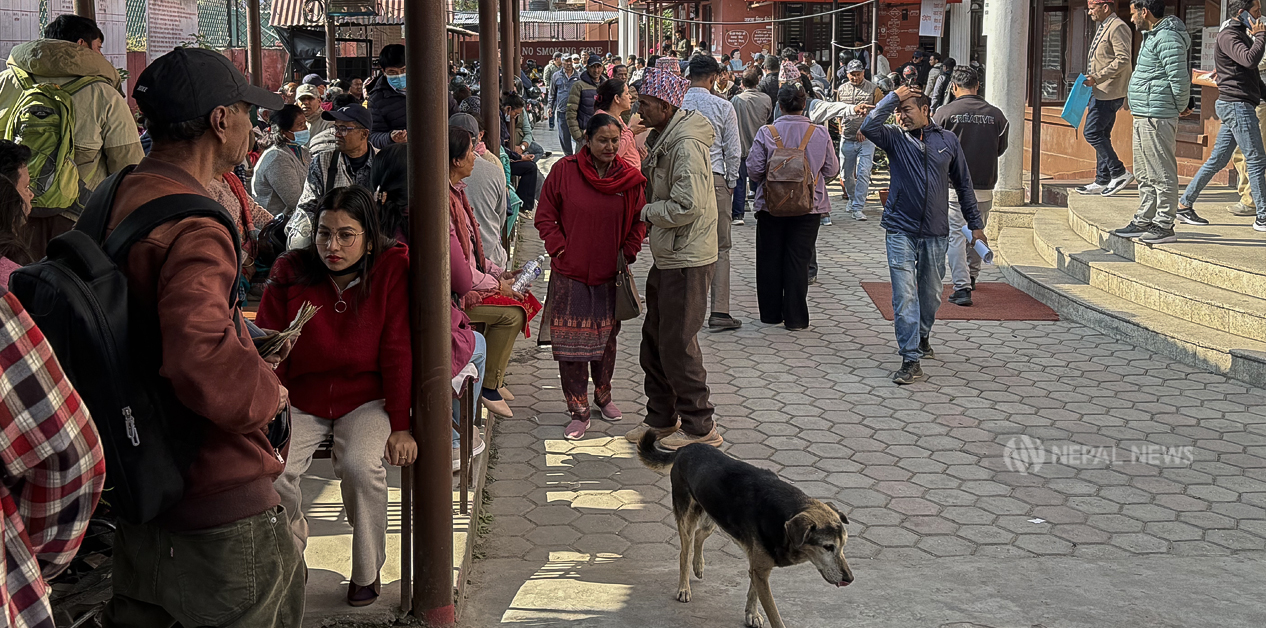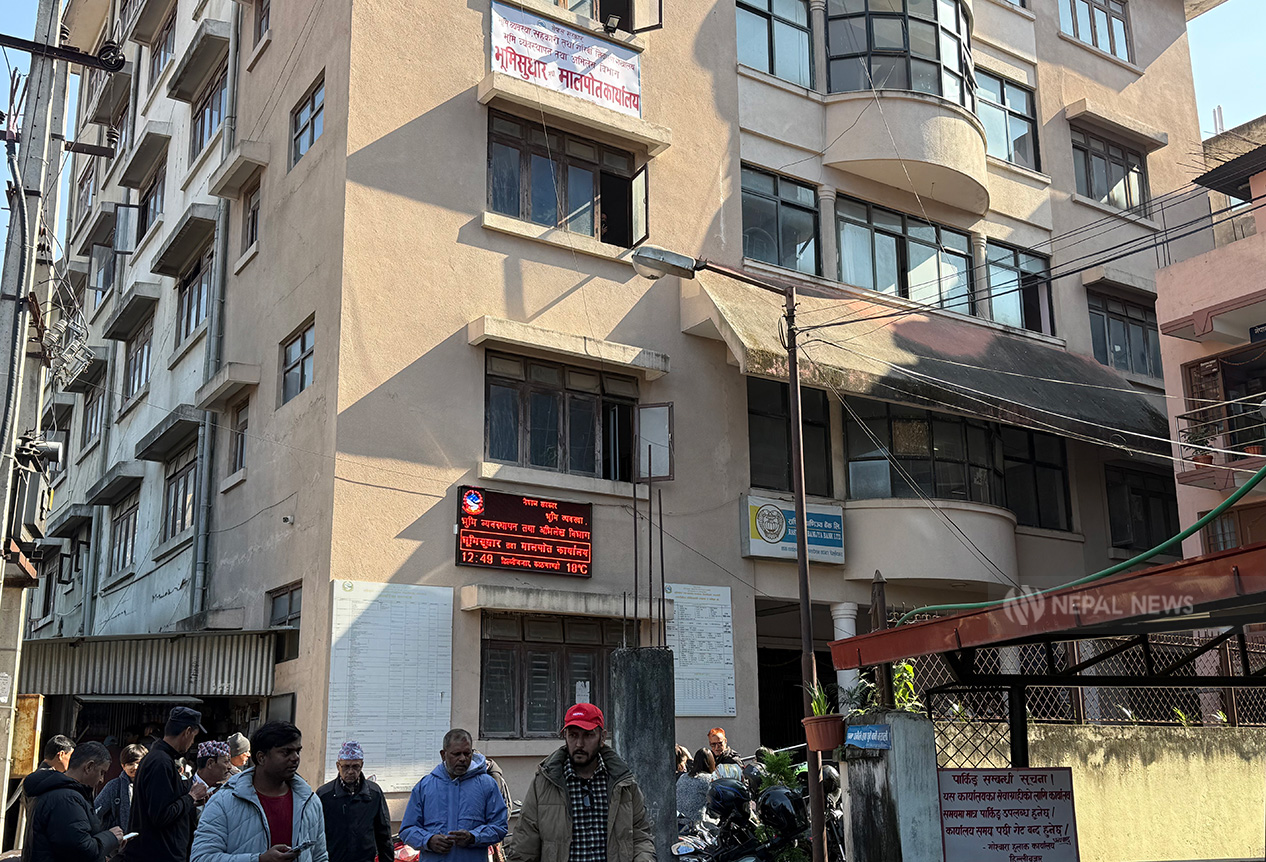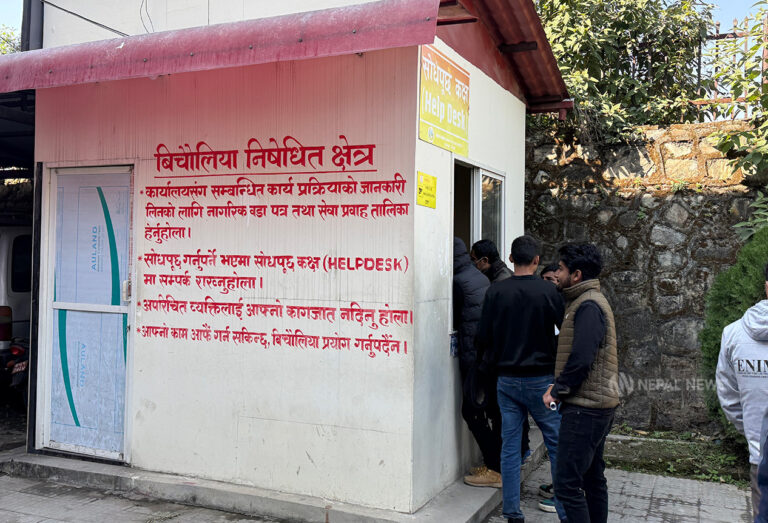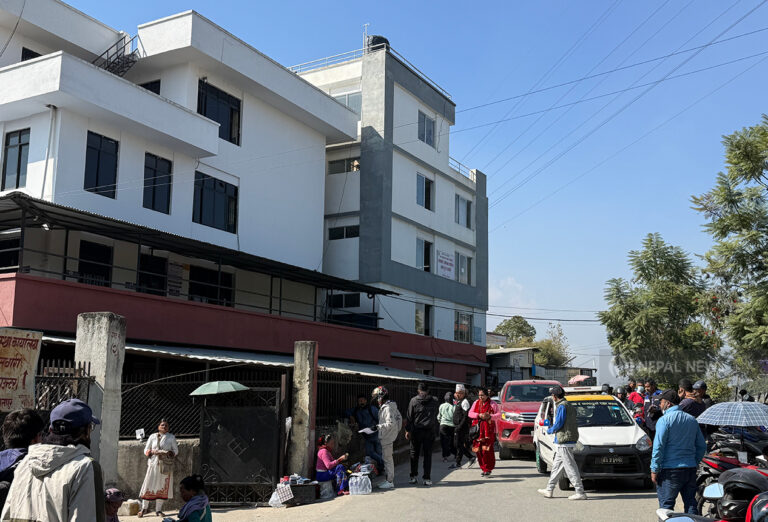
Government desks are paralyzed as brokers operate openly, extracting money from desperate service seekers

KATHMANDU: A large sign on the wall just inside the main gate of the Transportation Management Office, Ekantakuna, Lalitpur, prominently reads, “Middlemen-Restricted Zone.” The official warning, posted right in the inquiry room, is meant to deter complaints about undue gain occurring on the premises. However, the scene just outside the gate is completely the opposite: brokers are openly found waiting to exploit innocent service seekers.
At almost any government office, documentation professionals, popularly known as brokers, agents, or middlemen, can be seen lurking around, randomly approaching service seekers.
On November 17, Khemraj Bajgain of Morang, who went to the office in Ekantakuna to renew his license, fell victim to a middleman’s scheme. He had started the foreign employment process and needed to renew his license immediately, so he had gone there. Before he could even enter the gate, documentation professional and broker Rajesh Gurung asked, “Are you making a new license or just renewing?”
After hearing Bajgain’s answer, Gurung said that filling out the online renewal form would cost Rs 500. “When I reached Ekantakuna, I was surrounded by documentation professionals. I needed to finish the work quickly no matter what, so I had the professional do the documentation I could have done myself,” he says.
Gurung’s daily routine is spent stopping service seekers outside the office and getting work done through himself. He is found stopping people outside the office gate who come for license renewal, making new licenses, or transferring new and old vehicle ownership. Gurung openly states that the documentation fee for transferring vehicle ownership is Rs 3,000. He says, “We have our own rates; the minimum fee is Rs 3,000, and if you need to renew a license or fill out a new form, it costs Rs 500.”
Meanwhile, service seekers can fill out the online renewal form themselves online or with the help of employees for free. There is no fee for filling out the renewal form. The government fee set for filling out a new form is only Rs 500. The government duty for making a new license after passing the trial and giving biometrics is Rs 2,000.
However, the head of the Transport Office, Keshab Kumar GM, claims that there are no middlemen, brokers, or agents in his office. He says, “Intermediaries do not enter my office. If someone is causing trouble outside the gate, I am unaware. Service seekers can fill out the forms for new licenses and renewals themselves, and our employees fill them out for those who cannot. Service seekers do not need to go to any intermediaries.”

Land Revenue Office in Dillibazaar, Kathmandu. Photo: Khila Nath Dhakal
The Small and Large Vehicle Office is connected to GM’s office. According to office head Pabitra Kunwar, daily transfer of four-wheeled vehicles, new registrations, and pollution checks take place there. About 2,000 new vehicles are registered per month. “More than 100 vehicles are processed daily,” she says. “No kind of agent, broker, or documentation professional is needed for this work; service seekers can do it themselves without any hassle.”
However, the service described by Kunwar was not visible there. The sight of documentation professionals surrounding service seekers for government services and taking money seems normal. Kunwar, however, claims that they cannot legally question the work of so-called documentation professionals outside. “Since the documentation business is lawful, we cannot ask them to leave,” she says. “When some service seekers themselves seek the help of documentation professionals, the office’s system becomes weak.”
There are around 300 so-called documentation professionals just in Ekantakuna. They are active under the pretext of providing easy and fast service to the public. In return for that work, they collect hefty amount of money. In the name of facilitation, documentation professionals are playing the role of a “middleman.” Kunwar says, “How can we directly call documentation professionals who have legal rights ‘intermediaries’? As for what they do outside, they only come inside the office for verification.”
A different, but equally problematic, scene unfolds at the Land Revenue Office in Lagankhel. There, as many as 300 documentation professionals are active, their numbers often rivaling that of the service seekers. Many of these 300 professionals are frequently observed haggling with clients over fees, which vary based on the nature of the work. For a simple land transfer, documentation professionals openly charge a minimum fee of Rs 7,000, with additional amounts collected depending on the complexity of the service.
There are around 300 so-called documentation professionals just in Ekantakuna. They are active under the pretext of providing easy and fast service to the public. In return for that work, they collect hefty amount of money.
Kul Chandra Dahal is a documentation professional active at the Land Revenue Office, Lagankhel. He says that he charges a fixed fee for land transfer and for getting work done quickly. He argues that in some cases, he has to pay Rs 3,000 to the Land Revenue Office employees in the section. He says, “It costs Rs 10,000 to settle everything inside and outside. Our job is to make it easy for the service seeker, and facilitation costs a fee.”
Rashmi Shrestha of Dhobighat, Lalitpur, is a victim who took service through a documentation professional. She says, “I had to pay Rs 12,000 additional to transfer land. I went to meet the office staff; they showed me the documentation professionals, and when I went outside, they told me that they had to manage things both inside and outside.”
The Survey Office is connected to the Lagankhel Land Revenue Office. During office hours, both offices are surrounded by documentation professionals. Office head Ashok Kumar Bhattarai says, “I don’t know what kind of conversation service seekers have with documentation professionals. There have been no complaints of service seekers paying extra money inside the office.”
Senior Superintendent of Police (SSP) Hobindra Bogati, Chief of the Lalitpur District Police Complex, also says that complaints about the increasing dominance of intermediaries and middlemen in government offices have been received. “Complaints come that documentation professionals are the main source of intermediaries,” Bogati says. “It is difficult to arrest licensed individuals without evidence. Service seekers do not file complaints of being defrauded. Nevertheless, knowing that intermediaries have increased, we have stepped up surveillance.”
For a simple land transfer, documentation professionals openly charge a minimum fee of Rs 7,000, with additional amounts collected depending on the complexity of the service.
Passports cannot be made without a middleman
In the Department of Passports, Tripureshwor, most of the work of service seekers is also done by brokers. They have harassed the service seekers who arrive there forever. In fact, brokers have established a foothold in the department, claiming they can make passports quickly. The dominance of brokers in the department was exposed after police arrested 11 people from the Passport Department on November 16 and 17. Before being arrested, they were at the gate of the Passport Department. The department had received complaints that they were collecting Rs 5,000 to Rs 7,000 from service seekers to make passports.
According to Department Director Maheshwar Mani Tripathi, the Ministry of Home Affairs had to be called upon to remove brokers from around the department premises. Recently, brokers had become active, taking advantage of the increased crowd for making passports at the Department of Passports. “Documentation professionals are not even needed here. Taking advantage of the increased number of people, ride-sharing drivers were doing the work of intermediaries,” Tripathi says. “The situation has somewhat eased after the police arrests and monitoring.”
According to him, two under-secretaries are assigned to room number 20 of the passport department. They prepare the documents for those who come to make passports. After the arrest of brokers, the Department of Passports issued a notice on November 19, making a public appeal with phone numbers to be cautious of fraud. However, the phone numbers published by the department do not get picked up. One number has been requested to be switched off, and messages are asked to be sent on WhatsApp. The other phone number does not get picked up. Even other phone numbers on the department’s website are rarely answered. Tripathi says, “We have fewer employees compared to the work. We work from 10 AM to 9 PM, and we do not have staff just to pick up the phone and talk.”
The dominance of brokers in the department was exposed after police arrested 11 people from the Passport Department on November 16 and 17. The department had received complaints that they were collecting Rs 5,000 to Rs 7,000 from service seekers to make passports.
The consequence of government offices not being free of middlemen is the incident of June 13, 2025. On that day, the Commission for the Investigation of Abuse of Authority (CIAA) raided the Transport Office in Chitwan and driving centers in Chitwan. A team dispatched from the CIAA’s Tangle office raided the Transport Office, the Mahalaxmi Driving Center, the Gurung Driving Center, and the Kumar Driving Center, where service seekers’ trial exams are conducted.
According to CIAA spokesperson Rajendra Kumar Paudel, the raid was conducted after increasing complaints of corruption in license distribution due to collusion between driving center employees and the head of the Transport Office. The CIAA team arrested 49-year-old Indrajit Gurung, an office assistant at the Transport Office, a resident of Simaldhap, Ichchhakamana Rural Municipality-7, Chitwan, and currently residing in Kailashtole, Bharatpur Metropolitan City-11, Chitwan, with Rs 185,000 from his workplace. During the operation, 31-year-old Suraj Pathak, a resident of Sulikot Rural Municipality-5, Gorkha, and currently residing in Bharatpur-11, was also arrested.
The CIAA seized 31 mobile phones, two laptops, and various documents from the then office head Bishnu Kumar Bhattarai and 22 other employees and driving center operators. It was found that people who failed the license exam were charged Rs 15,000 to Rs 25,000 per person for licenses through collusion between Transport Office employees and driving center employees.
Hassle for service seekers
Not only in the Kathmandu Valley but in most government offices across the country, service seekers who want to do their own work do not find it easy. In some government offices, there is a lot of crowd, and it takes a long time to finish the work oneself. These offices include Land Revenue, Survey, Transport, and District Administration offices. In most offices, files submitted through intermediaries move quickly, but files submitted by the service seekers themselves face delays.
Rashmi Shrestha, a service seeker met at Lagankhel Land Revenue on November 16, says, “No matter how strict the rules are inside, they are collecting money outside in the name of providing us easy service.” According to her, customers who hand over their work to brokers do not have to wait in line or spend hours. There is a distortion in the government system itself where work is done through brokers by paying extra money.
Former Secretary Gopinath Mainali, who worked in the Ministry of Land Reform and Management, says, “The government created a guideline to activate documentation professionals, claiming it was for the ease of service seekers. But this acted as a mediator between the service seeker and the service provider. As many have said, it acted as a middleman.” He believes that the delay in government offices has also turned many documentation professionals into intermediaries. If government offices were organized and dedicated to providing easy service to service seekers, various types of intermediaries would become inactive.

Transport Office in Ekantakuna, Lalitpur. Photo: Khila Nath Dhakal
For example, after the Gen Z protest, documentation professionals have started disappearing from the District Administration Offices in Lalitpur, Kathmandu, and Bhaktapur. Their activity has decreased compared to before. Chief District Officer of Lalitpur, Prem Prasad Bhattarai, says, “There are no intermediaries around my office. If any intermediary in the name of a documentation professional is found entering the office, immediate action is taken.”
The rampant activity of intermediaries in government offices is not just a problem for one office; it has become a common problem for government offices across the country. This has distorted the entire public service system. The informal structure outside the office is much more powerful than the board posted inside the government office stating, “Middlemen-Restricted Zone.” That structure deceives service seekers in the name of ease.
Former Secretary Mainali recalled the trouble caused by brokers active in the name of documentation professionals when he was the Secretary of the Ministry of Land. “I tried to strengthen the online system, but the circle of documentation professionals was so large that it could not be broken,” he says. “When the minister and secretary went out for monitoring together, the minister’s communication leaked. When I went to monitor the office, the documentation professionals even held demonstrations, accusing me of having a negative view, and almost locked me inside the office.”
CIAA annual report mentioned that 37,026 complaints were received from across the country. Of these, the highest number, 2,136 complaints, are related to the Ministry of Land Management, Cooperatives, and Poverty Alleviation. This data shows that the highest amount of maneuvering by intermediaries occurs in the Land Revenue Office.
The Ministry of Land Reform and its subordinate offices are also places with high numbers of complaints. The role of brokers contributes to the increase in service seeker complaints. On September 21, the Commission for the Investigation of Abuse of Authority (CIAA) submitted its annual report for the fiscal year 2024/25 to the President. It mentioned that 37,026 complaints were received from across the country. Of these, the highest number, 2,136 complaints, are related to the Ministry of Land Management, Cooperatives, and Poverty Alleviation. This data shows that the highest amount of maneuvering by intermediaries occurs in the Land Revenue Office.
Documentation professional in law, brokerage in role
The fact that documentation professionals are active in the role of middlemen is not new. They are the first people service seekers encounter when coming to a government office. Unnecessary fees are collected from service seekers with their facilitation. In fact, the government’s policy is also responsible for activating intermediaries. Documentation professionals have been active since the government recognized the documentation business on May 24, 1996. At that time, the documentation business was registered under the Institution Registration Act, 1977.
Later, from June 12, 2006, documentation professionals became more active under the National Guidance Act, 1961. Since then, the Nepal Lekhapadhi Kaanoon Byawasai Association has been activated by the court itself. Now, the District Court itself issues licenses to documentation professionals. Even those with basic literacy (who can read and write Nepali) receive documentation licenses.
Currently, efforts are underway to further systematize the documentation business under the Code of Conduct for Legal Practitioners, 1994. The Council is preparing to set the minimum qualification for documentation business as SLC/SEE. Hari Prasad Paudel, General Secretary of the Nepal Lekhapadhi Kaanoon Byawasai Association, says, “Efforts are being made to further systematize a business that only required basic literacy.”
From June 12, 2006, documentation professionals became more active under the National Guidance Act, 1961. Since then, the Nepal Lekhapadhi Kaanoon Byawasai Association has been activated by the court itself. Now, the District Court itself issues licenses to documentation professionals.
In that regulation, documentation professionals are given the authority to work in the semi-judicial area. Documentation professionals are made active in simple legal documents such as attending court hearings, presenting witnesses, and executing acknowledgments.
According to Paudel, the Association has not fixed a fee for service seekers for such work. It is said that the amount to be taken or given is up to the service seeker’s discretion. However, documentation professionals are charging and collecting fixed fees from service seekers. “Documentation professionals have fixed the fees themselves. Documentation professionals do not work as brokers. In fact, what an intermediary is or is not clear,” he says. “A person who plays a role between the buyer and seller is probably called an intermediary. Documentation professionals prepare documents; they do not work as middlemen.”
There are 20,000 licensed documentation professionals across the country. They are active at the federal, provincial, and district levels. Documentation professionals are active under the Central Committee at the center, Provincial Committees in the provinces, the Kathmandu Valley Coordination Committee in the Valley, and District Committees, District Coordination Committees, and Unit Committees in other districts.
The Association and the Dillibazaar Land Revenue Office share the same premises. The central office of the documentation professionals is inside the Land Revenue Office itself. The head of the Dillibazaar Land Revenue Office, Kaji Bahadur Bista, counters by asking who a middleman is. “There are no middlemen in our office. All documents are processed through the system (Land Service Center). No intermediary has brought a service seeker here.”
Land Service Centers under control of documentation professionals
The Department of Land Management and Archives identified the need to make service delivery smart and transparent through digital means to address service seeker complaints. Based on this, the Land Service Center Operation Directive, 2019, was introduced. According to Department Spokesperson Hari Prasad Panta, this system centrally stores the details of land and landowners across the country on a single department server.
Data and details required by the department and stakeholders can be easily obtained. Daily revenue and transaction numbers collected in offices where online service is implemented can be obtained from the department whenever needed. Details of land owned by a single person across the country can be easily traced.
The system includes automatic calculation of registration fees, capital gains tax, service charges, and other revenue collected by the Land Revenue Office when transferring property ownership. It provides for entering the approved minimum land valuation amount into the system, ensuring that transactions cannot be done with a stated price less than the minimum valuation when transferring property ownership.
The system also includes provision for entering the fingerprints, signatures, and photos of the grantor, grantee, and witnesses into the system via electronic devices and testing them when buying and selling property. Additionally, there is a provision for the landowner to receive notification via SMS and email before the application/document for property ownership transfer is approved.

A heavy crowd outside the Ekantakuna Transportation Office in Lalitpur, where middlemen openly operate. Photo: Khila Nath Dhakal
According to the directive, the Land Service System was implemented nationwide starting from 2021. The expectation was that service seekers themselves could access the system as much as possible. In this system, landowners could obtain a One Time Password (OTP), access the online system, and fill out applications and forms. It was stated that in cases where service seekers could not do it themselves, the service would be provided through the local units (metropolitan, sub-metropolitan, municipality, or rural municipality).
However, the implementation of the directive turned out to be the opposite. Instead of targeting service seekers, it activated the “brokers.” Former Secretary Mainali says, “The system superficially appeared to target the general public. It was said that if they could not do it themselves, the local body would help, but it was ultimately implemented in a way that benefited documentation professionals popularly known as brokers, agents, or middlemen.”
With the establishment of Land Service Centers across the country, the online system of Land Service has come under the control of documentation professionals. According to Department Spokesperson Panta, there are 135 Land Revenue Offices in 77 districts. Under these offices, 3,769 Land Service Centers have been established. Of these, 3,275 Land Service Centers are registered in the name of documentation professionals.
There are 450 Land Service Centers in the name of banks and financial institutions, 37 in local bodies, 29 in cooperatives, 19 in the Provident Fund, and five in the name of the Citizen Investment Trust. When asked why the system did not target service seekers, Panta says, “There are complaints that the service has not reached the target group, and efforts are being made to address this. We see the need to introduce a separate program to make the service centers accountable.”
After the Gen Z protest, the current interim government is not without the opportunity to streamline service delivery and free government offices from brokers. However, the government remains a silent spectator, even though the dominance of brokers remains the same in government offices across the country, except for a few.